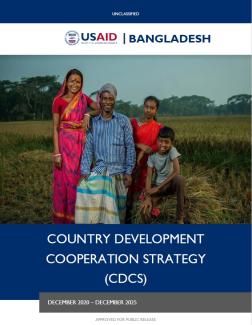Strategically located in South Asia, Bangladesh is a key Indo-Pacific partner with huge development potential. In recent decades, it has experienced consistent economic growth, made impressive gains in educational attainment and health, and hosted a vibrant civil society. Bangladesh also faces formidable challenges. The country’s journey to self-reliance is impeded by vulnerable topography, exclusionary practices that prevent many Bangladeshis from participating fully in the country’s economic and civic life, and pervasive corruption. Hosting the world’s largest refugee population also brings unique challenges to this already overpopulated country.
The United States Agency for International Development’s (USAID) 2020 to 2025 Bangladesh Country Development Cooperation Strategy (CDCS) acknowledges Bangladesh’s challenges and leverages its assets. Accordingly, the Goal of this CDCS is that Bangladesh is committed to democratic principles and inclusive growth with an increasing capacity to economically diversify, address inequality, and become a resilient Indo-Pacific partner.
The Goal seeks to galvanize Bangladesh's Journey to Self-Reliance (J2SR), aligns with the U.S. Government’s priorities for the Indo-Pacific region, and supports Bangladesh's goal of attaining upper-middle income country (UMIC) status by 2031. As illustrated in Figure 1, the Results Framework (RF), USAID has identified three Development Objectives (DOs) to support the Goal:
- DO 1: Improved Democratic Systems that Promote Transparency, Accountability, and Integrity
- DO 2: Enhanced Opportunities for an Inclusive, Healthy, Educated Society, and a Robust Economy
- DO 3: Strengthened Resilience to Shocks and Stressors
USAID will build on its work in economic growth, education, health, energy, environment, food security, disaster preparedness, and democracy and good governance. This CDCS differs from earlier strategies by articulating an innovative and intentional approach to achieve results through increased synergies across the portfolio. USAID plans to slowly shift from technical assistance to policy assistance to build country management capacity. In addition, there will be an increased focus on coordinating and leveraging donor resources that can provide the highest returns. Because good governance drives social and economic progress, USAID improves governance across sectors by improving citizens’ ability to hold elected and appointed officials accountable and strengthening the institutional capacity of government bodies to meet constituents’ needs (DO 1). Achieving sustainable economic growth (EG) and self-reliance requires a healthy, well-educated population served by a government that can deliver high quality social services.
USAID will leverage the gains made through good governance by using a private sector approach to enhance organizational and individual capacity that will enhance the socioeconomic opportunities for citizens (DO 2). However, development gains are consistently threatened in Bangladesh by vulnerabilities that inhibit inclusive growth, create setbacks, and undermine the country’s progress. As such, USAID will strengthen the transformative, absorptive, and adaptive capacities of individuals, communities, and institutions to be resilient to acute shocks and chronic stressors (DO 3).
This CDCS employs an integrated, inclusive approach with mutually reinforcing DOs that reflect the interdependence of development sectors. The new Goal and RF emphasize Bangladesh’s J2SR and USAID’s expectation that the Government and people of Bangladesh will assume greater ownership of their own development. The CDCS leverages the Government of Bangladesh’s (GoB) plans to become a UMIC and uses these stated aspirations as the impetus for improved partnership, more sustainable development outcomes, and ultimately, self-reliance. The Mission capitalizes on the integration of key development efforts, especially good governance programming and private sector engagement (PSE), to drive impact across the DOs.

